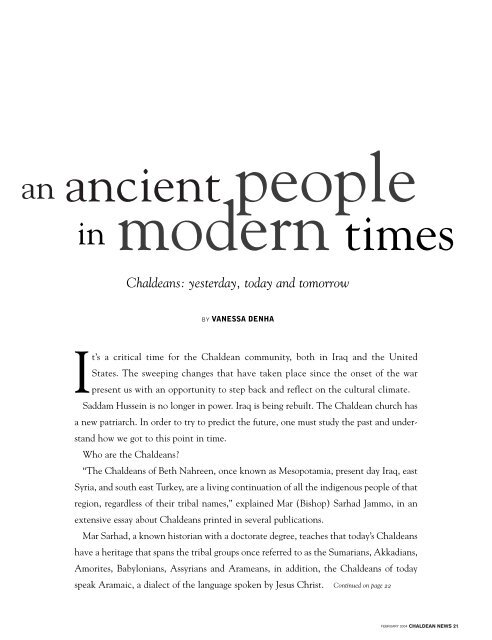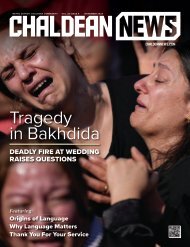You also want an ePaper? Increase the reach of your titles
YUMPU automatically turns print PDFs into web optimized ePapers that Google loves.
an ancient people<br />
in modern times<br />
Chaldeans: yesterday, today and tomorrow<br />
BY VANESSA DENHA<br />
It’s a critical time for the Chaldean community, both in Iraq and the United<br />
States. The sweeping changes that have taken place since the onset of the war<br />
present us with an opportunity to step back and reflect on the cultural climate.<br />
Saddam Hussein is no longer in power. Iraq is being rebuilt. The Chaldean church has<br />
a new patriarch. In order to try to predict the future, one must study the past and understand<br />
how we got to this point in time.<br />
Who are the Chaldeans?<br />
“The Chaldeans of Beth Nahreen, once known as Mesopotamia, present day Iraq, east<br />
Syria, and south east Turkey, are a living continuation of all the indigenous people of that<br />
region, regardless of their tribal names,” explained Mar (Bishop) Sarhad Jammo, in an<br />
extensive essay about Chaldeans printed in several publications.<br />
Mar Sarhad, a known historian with a doctorate degree, teaches that today’s Chaldeans<br />
have a heritage that spans the tribal groups once referred to as the Sumarians, Akkadians,<br />
Amorites, Babylonians, Assyrians and Arameans, in addition, the Chaldeans of today<br />
speak Aramaic, a dialect of the language spoken by Jesus Christ.<br />
Continued on page 22<br />
<strong>FEBRUARY</strong> <strong>2004</strong> CHALDEAN NEWS 21

















